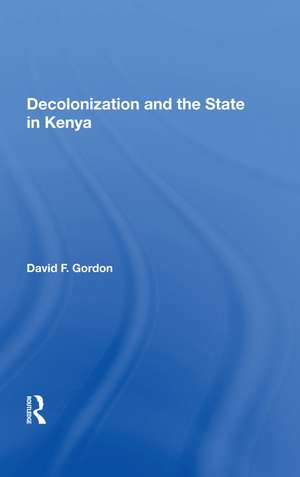Decolonization And The State In Kenya
Autor David F. Gordonen Limba Engleză Hardback – 23 mai 2019
Preț: 768.19 lei
Preț vechi: 1029.76 lei
-25% Nou
Puncte Express: 1152
Preț estimativ în valută:
146.100€ • 157.19$ • 122.56£
146.100€ • 157.19$ • 122.56£
Carte tipărită la comandă
Livrare economică 17 aprilie-01 mai
Preluare comenzi: 021 569.72.76
Specificații
ISBN-13: 9780367005757
ISBN-10: 0367005751
Pagini: 280
Dimensiuni: 152 x 229 mm
Greutate: 0.68 kg
Ediția:1
Editura: Taylor & Francis
Colecția Routledge
Locul publicării:Oxford, United Kingdom
ISBN-10: 0367005751
Pagini: 280
Dimensiuni: 152 x 229 mm
Greutate: 0.68 kg
Ediția:1
Editura: Taylor & Francis
Colecția Routledge
Locul publicării:Oxford, United Kingdom
Cuprins
Concepts, Issues and Context -- Decolonization and the State: An Analytical Framework -- Kenya: The Global and Historical Setting -- The Evolution of Colonial Political Strategies -- Post-War Kenya: Prelude to Crisis, 1945–1952 -- Defeating ‘Mau Mau’: Multi-Racial Reform, 1953–1959 -- Towards ‘Uhuru’: The Decolonization Strategy, 1960–1963 -- Colonial Crises and State Responses -- Peasants vs. Settlers: Land and Agricultural Policies -- Managing Industrialization: Capital, Labor and the State -- Desegregating Commerce: African Businessmen and the State -- Conclusions: The Meaning of Decolonization
Descriere
In this book the author examines the efforts of the colonial regime to shape the process of decolonization in Kenya from the end of World War II until independence in 1963, focusing on the conflict between the state’s two imperatives–promoting economic development and establishing and maintaining control. Dr. Gordon reviews the different political strategies devised by senior colonial officials in response to the growing socioeconomic and political tensions within Kenya and to the evolving guidelines emanating from London. He looks at how these strategic assumptions affected the policies the colonial regime attempted to implement in the areas of land and agriculture, labor and industrial relations, and the development of African trade. He challenges the view that the colonial regime effectively dominated and determined the direction of decolonization and concludes by relating the findings of the Kenyan case to wider debates about the meaning of decolonization in Africa.
